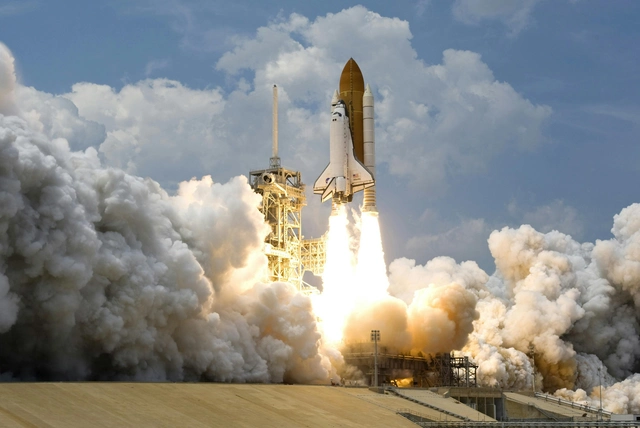Space Travel
An extensive exploration of the history, technology, and future of human space exploration
1. What is Space Travel?
Space travel refers to the act of traveling into or through outer space. It can be undertaken by humans in spacecraft or by robotic missions exploring distant planets and celestial bodies.
- Types of Space Travel: Space travel can be categorized into manned and unmanned missions. Manned missions involve astronauts aboard spacecraft, while unmanned missions include robotic probes exploring outer space.
- Purpose of Space Travel: The primary purposes of space travel include scientific research, exploration of other planets, technological advancement, and potential colonization of other worlds.
2. History of Space Travel
The history of space travel is marked by significant milestones, from early theoretical concepts to successful manned missions and ongoing exploration.
- Early Theories and Concepts: The idea of space travel dates back to ancient civilizations. Notable thinkers like Johannes Kepler and Konstantin Tsiolkovsky laid the groundwork for modern rocketry and space exploration.
- The Space Race: The Cold War spurred the Space Race between the USA and the USSR. Key events included the launch of Sputnik by the USSR in 1957 and the Apollo 11 moon landing by the USA in 1969.
- International Cooperation: Post-Cold War, countries began to collaborate in space exploration, leading to joint missions and the establishment of the International Space Station (ISS) in 1998.
3. Technological Advancements in Space Travel
Technological innovations have played a crucial role in making space travel possible and safer for astronauts and missions.
- Rocket Technology: Advancements in rocket technology, such as the development of reusable rockets by companies like SpaceX, have significantly reduced the cost of launching payloads into space.
- Life Support Systems: Life support systems in spacecraft are designed to provide astronauts with air, water, and food, ensuring their survival during extended missions.
- Navigation and Communication: Modern spacecraft utilize advanced navigation systems and communication technology to ensure precise trajectory and real-time data transmission back to Earth.
4. Manned Space Missions
Manned space missions have been pivotal in advancing our understanding of space and the effects of space travel on the human body.
- Famous Missions: Notable manned missions include the Mercury and Gemini programs, Apollo moon landings, and more recent missions to the ISS, contributing significantly to space research.
- Astronaut Training: Astronauts undergo rigorous training that includes simulations of space conditions, physical fitness training, and learning to operate complex spacecraft systems.
5. Robotic Space Missions
Robotic missions have provided invaluable data about our solar system and beyond, often venturing where humans cannot yet go.
- Mars Rovers: Robotic rovers, such as Spirit, Opportunity, and Curiosity, have explored the Martian surface, conducting experiments and sending data back to Earth.
- Space Probes: Space probes like Voyager 1 and 2 have traveled beyond our solar system, providing insights into interstellar space and distant celestial bodies.
6. Future of Space Travel
The future of space travel includes plans for deeper exploration of the solar system, potential colonization of other planets, and advancements in technology.
- Mars Colonization: Plans to send humans to Mars are underway, with NASA’s Artemis program and SpaceX’s Starship aiming to establish a human presence on the Red Planet by the 2030s.
- Commercial Space Travel: Private companies are working towards making space travel accessible to civilians, with companies like Blue Origin and Virgin Galactic leading the way in suborbital tourism.
7. Challenges of Space Travel
Space travel presents numerous challenges, including the physical effects of microgravity on the human body and the psychological impacts of isolation.
- Health Risks: Astronauts face health risks such as muscle atrophy, bone density loss, and radiation exposure during long-duration space missions.
- Psychological Challenges: Isolation and confinement during missions can lead to psychological stress. Strategies to combat these issues include team-building exercises and psychological support.
8. International Cooperation in Space
Space exploration is increasingly becoming a global endeavor, with various nations collaborating on significant projects.
- Joint Missions: Countries around the world collaborate on missions, such as those conducted aboard the ISS, where astronauts from different nations work together on research.
- Global Space Agencies: Agencies like NASA, ESA, Roscosmos, and others share knowledge and resources to advance space exploration.
9. Cultural Impact of Space Travel
Space travel has influenced culture and society in various ways, inspiring art, literature, and public interest in science and exploration.
- Inspiration for Art and Literature: The wonders of space have inspired countless works of art and literature, from science fiction novels to visual arts exploring cosmic themes.
- Public Engagement: Space missions capture public imagination, fostering interest in STEM (science, technology, engineering, and mathematics) fields and inspiring future generations of scientists and explorers.
10. The Ethics of Space Exploration
As humanity ventures further into space, ethical considerations regarding the use of extraterrestrial resources and the potential for contamination become increasingly important.
- Resource Utilization: The potential for mining asteroids and using resources from the Moon raises questions about ownership and environmental impact.
- Planetary Protection: Preventing contamination of celestial bodies is crucial to preserve the integrity of extraterrestrial ecosystems and avoid interfering with potential life forms.
Summary
- Space travel encompasses human and robotic missions to explore outer space.
- The history of space travel includes milestones from ancient theories to modern missions like the Apollo program and the ISS.
- Technological advancements have significantly improved rocket technology, life support systems, and navigation.
- Future endeavors include Mars colonization and commercial space travel for civilians.
- Challenges in space travel involve health risks, psychological impacts, and ethical considerations regarding extraterrestrial resources.
References
- - NASA: What is Space Travel? (NASA)
- - Space Exploration (European Space Agency)
- - The Space Race (NASA History Division)
- - NASA Technology Transfer Program (NASA)
- - NASA Astronaut Program (NASA)
- - NASA’s Robotic Missions (NASA)
- - NASA's Artemis Program (NASA)
- - Effects of Microgravity on Human Health (NASA)
- - International Space Station (NASA)
- - Space in Popular Culture (Smithsonian Magazine)
- - The Ethics of Space Exploration (The Planetary Society)
keywords: space travel; human exploration; astronauts; space missions.
Partner Suggestion
Most Beautiful Gardens in the World

